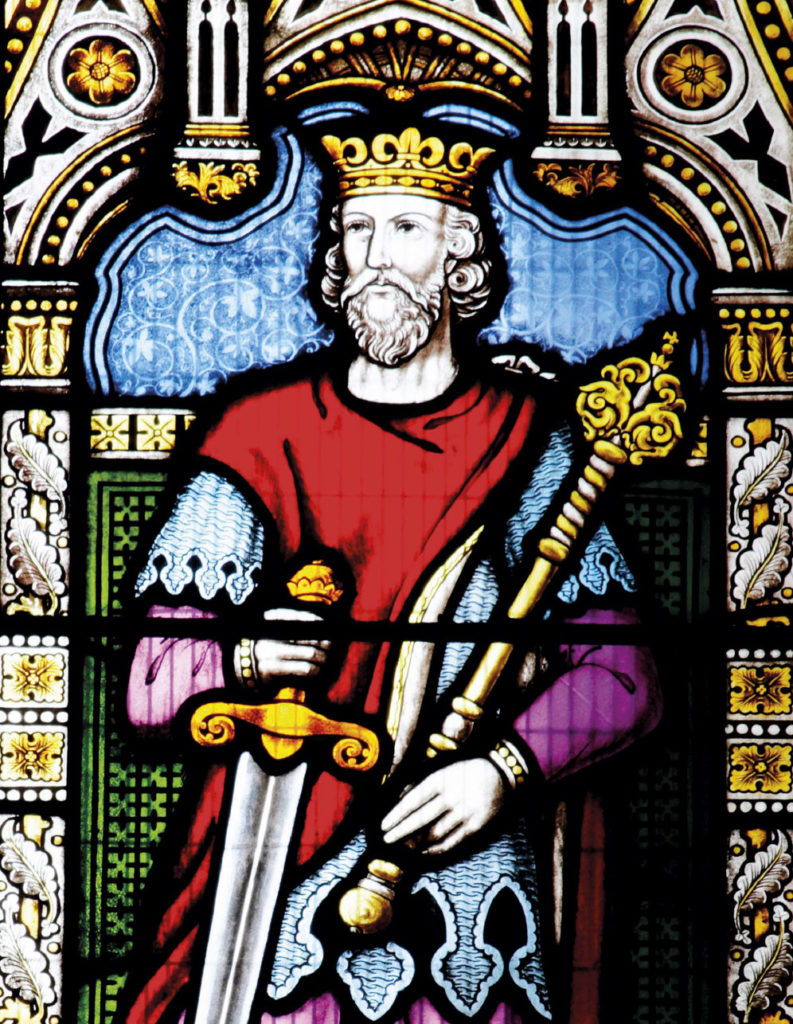
Stained glass of King Alfred the Great in Winchester Cathedral
St. Alfred the Great, King of Wessex
Wisdom 6:1-3, 9-12, 24-25
Psalm 21:1-7
2 Thessalonians 2:13-17
Luke 6:43-49
Click here to access these readings.
Today is the feast day of St. Alfred the Great, King of Wessex. And when you hear this, you might ask, “Who?” or “King of where?” Alfred was born in what is now Great Britain in 849 A.D. He was the son of the ruling king of Wessex, one of the small kingdoms that eventually became England. Alfred had three older brothers, and so it was unlikely that he would ever be king, except that he lived when the Vikings were invading the island. Alfred’s father died while defending the kingdom, and Alfred’s three brothers both ruled and were killed as well. While Alfred was king, the country was overrun and he survived, for a time, living in the forests with a small group of retainers. Alfred earned the title “the Great” by raising his ragged country-men and fighting back, but also in what he did afterwards. Alfred drew scholars from all across the land to reestablish learning and religion in his kingdom. He translated or helped to translate great works of knowledge, such as Boethius’ Consolation of Philosophy and St. Bede’s Ecclesiastical History of the English People.
In all, Alfred seems like a pretty great medieval king but perhaps a little odd for a saint. Although he helped revive Christian learning in England and translated some pretty important works into English, he was still, on the whole, a secular man. Alfred was known as being an extremely devout Christian and very knowledgable about Christian history and tradition, but, again, he was a king, and his main function in life was the defense and right rule of his people. And even though he sought to protect his people and to establish peaceful relations with his enemies (even so much as standing as godfather to a Viking king), he was, even still, a secular king. Why was Alfred made a saint?
This question leads us back to one I wrote about a week or so ago: what is a saint? Normally, we might think of saints as extremely holy people who did nothing but sit around and pray all the time, but in reality, saints were often very active people. They were holy and deeply good, but they did not shy away from life, especially a life of pain, suffering, and sacrifice for those around them. This goodness and saintliness can occur in any walk of life, both because God is present in any walk of life and because we humans, no matter where we are, always need God. And from his deep love of humanity, God sends men and women into some of the darkest places on earth so that we can remember God’s love and the salvation offered to us in Jesus Christ. These women and men are saints in God’s eyes first, and we discern their sainthood (as opposed to the other way around; we actually never “made” Alfred a saint, nor do they “become” saints on their own strength of will).
Alfred was a man who was born at a time of crisis, and he was called to a task that was perhaps too much for any person. And, as a king, Alfred fulfilled his duty: he fought for his people, he worked for peace where he could, and he sought to nurture people when swords were at last put away. But he did not just do his duty. Alfred did not simply fight a good fight. Alfred went above and beyond what the world called him to do and listened to a higher calling. This higher calling was through his vocation as a king, not against it, but even still it was higher than any might have expected. It was a call from God not only to protect but also to heal, not only to fight a war but to be concerned with what happens afterwards, not only to give out laws and decrees for the betterment of the people but also to practice what he preached. His work in a time of warfare reminds us in our own day to listen to what God is calling us to do through our work, our family, and our lives in our community. God is ever with us and calling us to a life more spiritually rich and more greatly founded upon Christ.
